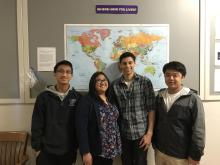Professor Sarah Elwood has been leading the GIS workshop course this spring, which is focused on team-based work on GIS application projects. By focusing on various subfields of geography, each team has been able to work with community or university partners. Team members carry a wide range of geographic experience, and this has allowed them to better tackle the challenges that some of these organizations hope to combat via spatial analysis.
One such group has partnered with Real Change Schools Opt Out; Geography majors Edwin Tablit, Gizelle Gando, Zach Wasington, and Lenstine Park are examining the effects of students who are choosing to opt out of public school testing in relation to demographic and neighborhood change in Seattle. If a student chooses to opt out of a standardized test, then their grade for the test is automatically registered as a fail. This creates a system where schools appear to be failing their students simply because they are choosing not to participate. Gizelle Gando, one of the group members, hopes to gather a better understanding between the correlations of students who opt out and raw data coming from the so called ‘failing schools’. “I’m an education minor and I’ve always had a passion for understanding gaps in the education system” she says. “There are more factors to consider than just labelling a school as good or bad based on standardized testing. It’s not so black and white”.
By looking at the offices of superintendents of public instructions for data on different groups, Gizelle and her team members hope to see if there are patterns between false failing schools and student participation in standardized tests. From there, they hope to address any racial or economic circumstances that they believe may be contributing factors to why these schools are actually failing.
Despite only working in small groups, Professor Elwood’s workshops have allowed students to partner up with larger community partners in order to attack overwhelming societal issues. The interests that group members like Gizelle have can easily help drive GIS solutions to problems that are occurring right in our own neighborhood.
